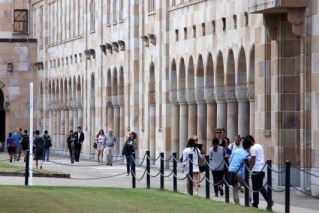Small business warns of closures if minimum award wage rise is pushed through
Small businesses could be forced to shutter if Australians on minimum and award wages receive a pay rise, the nation’s largest business body warns.

The ACTU's Sally McManus says the workplace reforms are being delayed despite community support. (Nikki Short/AAP PHOTOS)
The Fair Work Commission is undertaking its annual wage review this week and will hear from employers, unions and governments.
The Australian Council of Trade Unions has called for a five per cent increase and says inflation has left workers on awards more than $5000 worse off, even when accounting for their pay rises across the past three years.
But the Australian Chamber of Commerce and Industry (ACCI) has advocated for an increase of no more than two per cent, claiming inflation has been moderating and that the industrial umpire has been generous in its past two decisions.
“Business conditions have gotten markedly tougher,” ACCI chief executive Andrew McKellar told ABC Radio on Tuesday.
“We’re seeing investment moving sideways, we’re seeing a real sense of pessimism for many in business and importantly, labour demand is also starting to drop away.
“It’s getting much harder for businesses to employ people and for those on minimum wage, it’s much better to have a job than to watch others getting a pay rise.”
Nationals Deputy Leader Bridget McKenzie warns these rises could be eaten up by inflationary pressures.
“If the government doesn’t cut spending and get productivity going, every Australian that’s employed by a small business has their jobs at risk,” she told Nine’s Today on Tuesday.
The federal government has not called for a specific percentage increase and instead recommended “real wages of Australia’s low-paid workers do not go backwards”.
“We know that cost of living is a challenge and we want to make sure that (low-paid workers’) wages do keep up with cost of living,” Social Services Minister Amanda Rishworth said.
Inflation has been moderating from its peak in late 2022 and lifted 4.1 per cent in the 12 months to December 2023.
The Fair Work Commission factors in economic conditions when setting wages, including cost-of-living pressures and their financial toll on households.
At the same time, the commission is also alert to the possibility of a wage price spiral, where inflation expectations cause workers to ask for pay increases and businesses hike prices to cover those costs.
Employer groups will also have their say on the wage review this week.
ACTU secretary Sally McManus said the lowest paid workers were the hardest hit by inflation and businesses could afford the five per cent increase.
“When inflation goes up businesses are able to adjust their prices to protect their margins, but workers pay does not move so easily,” she said.
The union boss also said the five per cent increase would not be inflationary, with consumer prices moderating ahead of schedule even after the commission handed out the biggest minimum wage increase in four decades in 2023.
The decisions in the annual wage review affect about a quarter of Australian employees, including those on industry and business-specific awards and a smaller cohort on the minimum rate of pay.












